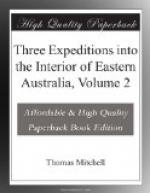NATIVE FEMALE AND CHILD.
As we went on our way rejoicing I perceived at length two figures at a distance who at first either did not see or did not mind us. They proved to be a gin with a little boy and as soon as the female saw us she began to run. I presently overtook her, and with the few words I knew prevailed on her to stop until the two gins of our party could come up; for I had long been at a loss for the names of localities. This woman was not so much alarmed as might have been expected; and I was glad to find that she and the gins perfectly understood each other. The difference in the costume on the banks of the Wando immediately attracted the notice of the females from the Lachlan. The bag usually carried by gins was neatly wove in basketwork and composed of a wiry kind of rush. She of Wando carried this bag fastened to her back, having under it two circular mats of the same material, and beneath all a kangaroo cloak, so that her back at least was sufficiently clothed, although she wore no dress in front. The boy was supported between the mats and cloak; and his pleased and youthful face, he being a very fine specimen of the native race, presented a striking contrast to the miserable looks of his whining mother. In the large bag she carried some pieces of firewood and a few roots, apparently of tao, which she had just been digging from the earth. Such was the only visible inhabitant of this splendid valley resembling a nobleman’s park on a gigantic scale. She stated that the main river was called Temiangandgeen, a name unfortunately too long to be introduced into maps. We also obtained the gratifying intelligence that the whole country to the eastward was similar to these delightful vales and that, in the same direction, as Piper translated her statement, “there was no more sticking in mud.” A favourable change in the weather accompanied our fortunate transition from the land of watery soil and dark woody ravines to an open country. The day was beautiful; and the balmy air was sweetened by a perfume resembling hay which arose from the thick and matted herbs and grass. Proceeding along the valley the stream on our left vanished at an isolated rocky hill; but, on closer examination, I found the apparent barrier cleft in two, and that the water passed through, roaring over rocks. This was rather a singular feature in an open valley where the ground on each side of it was almost as low as the rocky bed of the stream itself. The hill was composed




